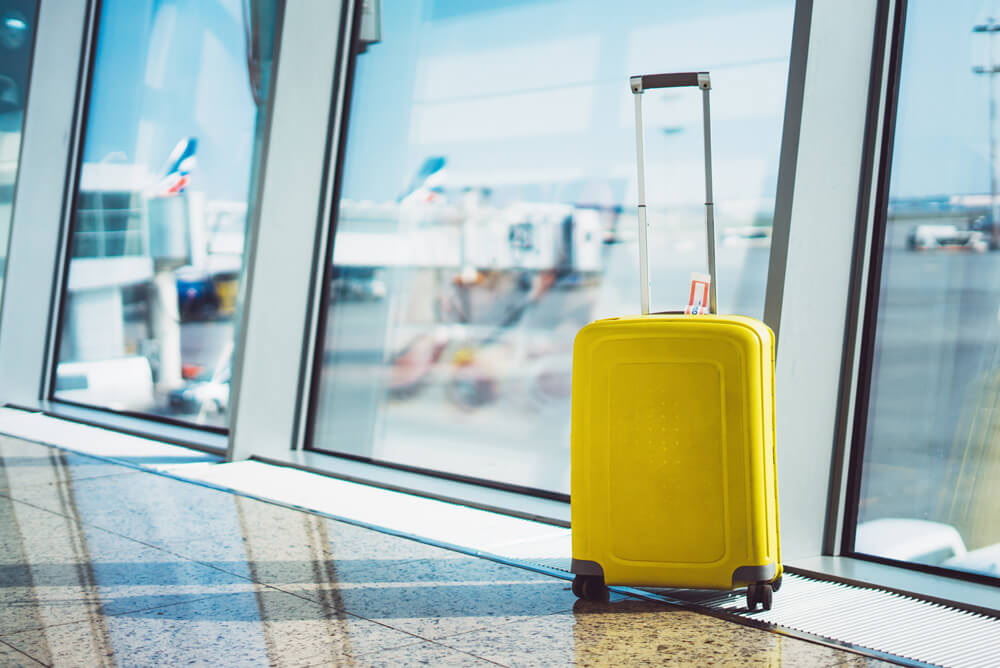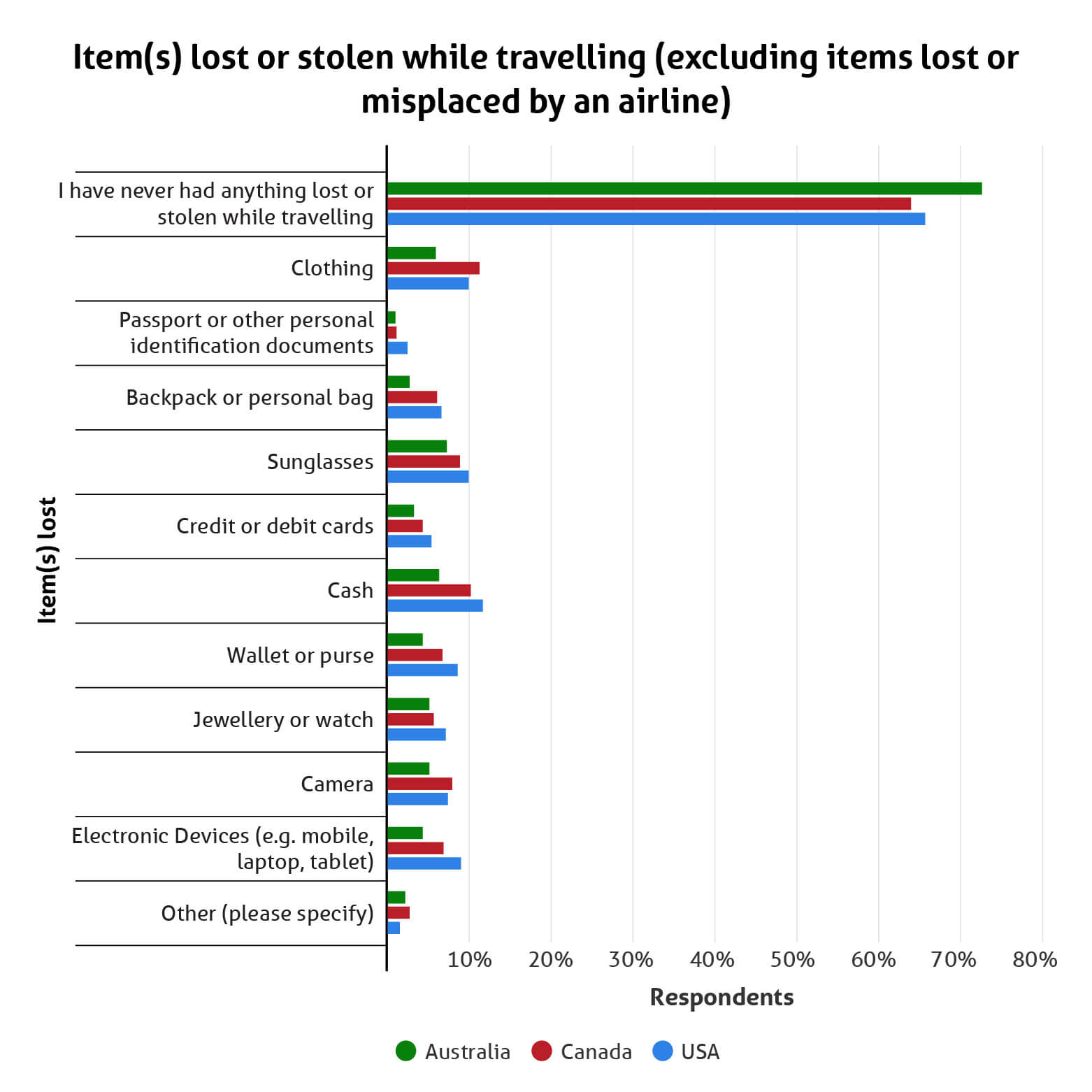The Burrow

Travelling can be an exciting time – you get to see new places, taste new food and experience new activities. All of this excitement can be gone in an instant upon finding out that your luggage has been lost.
As experts in travel insurance, we know losing your luggage is a travel nightmare, but we wanted to see just how common it is.
To find out, we surveyed more than 3,000 people across Australia, Canada and the USA.
Here’s what we found.
To see our findings in 2023, click here.

It turns out lost luggage is more common than we might think. According to our survey, about a quarter of respondents have had luggage go missing while travelling with an airline.
Canadian respondents reported the highest rate of lost luggage, with 30.4% answering yes. Australian flyers reported the lowest rate at 20.4%, with Americans landing right in the middle with a lost luggage rate of 25.9%.
| Australia | Canada | USA | Average | |
| Lost luggage | 20.4% | 30.4% | 25.9% | 25.6% |
| Never lost luggage | 79.6% | 69.6% | 74.1% | 74.4% |
The majority of travellers reported eventually getting their luggage back. Across each country surveyed, it was most common for travellers to receive their items within a few days. American flyers were most likely to receive their lost luggage within hours of losing it at a rate of 28.7%, as opposed to Australian and Canadian flyers (18.0% and 19.7% respectively).
9.8% of Australians, 14.9% of Canadians and 10.7% of Americans reported having to wait weeks to receive their bags, while a further 2.9% of Australians, 2.3% of Canadians and 3.4% of Americans needed to wait months for their belongings.
Unfortunately, 6.8% of Australians, 6.5% of Canadians and 6.9% of Americans reported never getting their luggage back.
| Australia | Canada | USA | Average | |
| Hours | 18.0% | 19.7% | 28.7% | 22.3% |
| Days | 62.4% | 56.6% | 50.2% | 56.0% |
| Weeks | 9.8% | 14.9% | 10.7% | 12.1% |
| Months | 2.9% | 2.3% | 3.4% | 2.8% |
| Luggage was never returned | 6.8% | 6.5% | 6.9% | 6.7% |
74.8% of flyers did not receive any reimbursement from their airline for lost luggage. Australian flyers reported the lowest rate of compensation, with only 21.5% of respondents receiving payment.
Conversely, Canadians reported the highest rate of reimbursement, with 29.1% of flyers receiving some form of compensation from their airline.
| Australia | Canada | USA | Average | |
| Reimbursed | 21.5% | 29.1% | 23.4% | 25.2% |
| Not reimbursed | 78.5% | 70.9% | 76.6% | 74.8% |
Of those that did receive compensation from airlines, American flyers reported the highest median reimbursement of US$275.00 (AU$439.18), Australian flyers received the second highest level of compensation, at a median rate of AU$400.00, and Canadian flyers reported the lowest level of reimbursement, at a median rate of CA$300.00 (AU$334.18).
| Australia | ||
| AUD | CAD | USD |
| $400.00 | $359.15 | $250.42 |
| Canada | ||
| AUD | CAD | USD |
| $334.18 | $300.00 | $209.21 |
| USA | ||
| AUD | CAD | USD |
| $439.18 | $394.33 | $275.00 |
Note: Currency converted on 22/01/25, using the rates 1AUD = 0.626045USD, 1AUD = 0.898031CAD, 1USD = 1.43389CAD
When looking at reimbursement from travel insurance, only 9.7% of flyers made a claim and received reimbursement. Of all flyers who lost luggage on their holiday, 37.2% made a claim and did not receive any reimbursement from their travel insurer.
Broken down by country, Canadian flyers were the most likely to not be reimbursed, at a rate of 41.7%, with Americans sitting on a rate of 36.8% and Australians on 30.7%.
Australians were the most likely to not make an insurance claim, at 43.9% – more than 15% higher than Canada and American flyers (26.5% and 24.5%).
Meanwhile, of these flyers who had their luggage lost, Australians reported the highest rate of travel insurance cover at 82.9%, while 79.6% of Canadian flyers reported the same and American flyers reported a cover rate of 70.1%.
| Australia | Canada | USA | Average | |
| Reimbursed | 8.3% | 11.3% | 8.8% | 9.7% |
| Not reimbursed | 30.7% | 41.7% | 36.8% | 37.2% |
| Did not make a claim | 43.9% | 26.5% | 24.5% | 30.5% |
| Did not have travel insurance | 17.1% | 20.4% | 29.9% | 22.7% |
Australians received the highest median payout from travel insurers, receiving AU$500.00. Canadian flyers received the lowest reimbursement, reporting a median payout of CA$300.00 (AU$334.14), while American flyers landed in the middle, with a median travel insurance reimbursement of US$287.50 (AU$459.14).
| Australia | ||
| AUD | CAD | USD |
| $500.00 | $448.93 | $313.02 |
| Canada | ||
| AUD | CAD | USD |
| $334.14 | $300.00 | $209.21 |
| USA | ||
| AUD | CAD | USD |
| $459.14 | $412.25 | $287.50 |
Note: Currency converted on 22/01/25, using the rates 1AUD = 0.626045USD, 1AUD = 0.898031CAD, 1USD = 1.43389CAD
Tracking devices, such as Apple’s AirTag and Samsung Galaxy’s SmartTag can be great, low-weight ways to track your luggage in the event your airline misplaces your bag. 15.6% of flyers reported using some sort of tracking device in their luggage. Broken down by country, Canadian flyers were the most diligent in keeping their luggage tracked, with 18.9% of Canadian luggage containing some sort of tracking device. American flyers landed with the second highest rate of tracking, with 15.4% of flyers tracking their luggage, while only 12.4% of Australian flyers reported the same.
| Australia | Canada | USA | Average | |
| Tracking device used | 12.4% | 18.9% | 15.4% | 15.6% |
| Tracking device not used | 87.6% | 81.1% | 84.6% | 84.4% |
Pickpocketing, theft and general forgetfulness can lead to travellers losing their smaller possessions. Fortunately, the majority of travellers have never lost small items or had them stolen while travelling.
It might be no coincidence that Australian flyers, living in a very sunny country, saw sunglasses as the most commonly lost item, with 7.2% of flyers having lost a pair while travelling.
Canadian travellers most commonly lost clothing while travelling, with 11.2% of flyers reported having lost clothing. Cash placed as a close second for Canadian travellers, with 10.1% reporting losing some amount.
Similarly, cash placed as the most lost item for American travellers, with 11.6% reported having lost some. Almost 10% of American travellers reported having lost possession of electronic devices while on holidays as well, the highest of all countries surveyed.

Note: Users could select multiple options, and as such results do not equal 100%.
Compare the Market’s Executive General Manager of General Insurance, Adrian Taylor, notes how travel insurance can cover your lost luggage if something goes wrong on holiday.
“Losing your luggage on your holiday can be a nightmare. If your airline loses your luggage, they might reimburse you for the loss, but even then, it could be days or weeks without your gear,” Mr Taylor said.
“At the same time, there is a chance that the reimbursement you receive does not adequately cover you for your loss or damages. This is where travel insurance can help you bridge the gap.
“Ensuring your travel insurance policy covers you against loss or theft, including cash and travel documents, could potentially leave you with more adequate reimbursement should things go awry.
“Luggage cover while travelling affords you a great deal of peace of mind and allows you to focus on your trip.”
Always read the Product Disclosure Statement (PDS) and Target Market Determination (TMD) to check for the inclusions, limits and restrictions before purchasing.
Compare the Market commissioned PureProfile to survey 1,004 Australian, 1,008 American and 1,015 Canadians adults in December 2024.